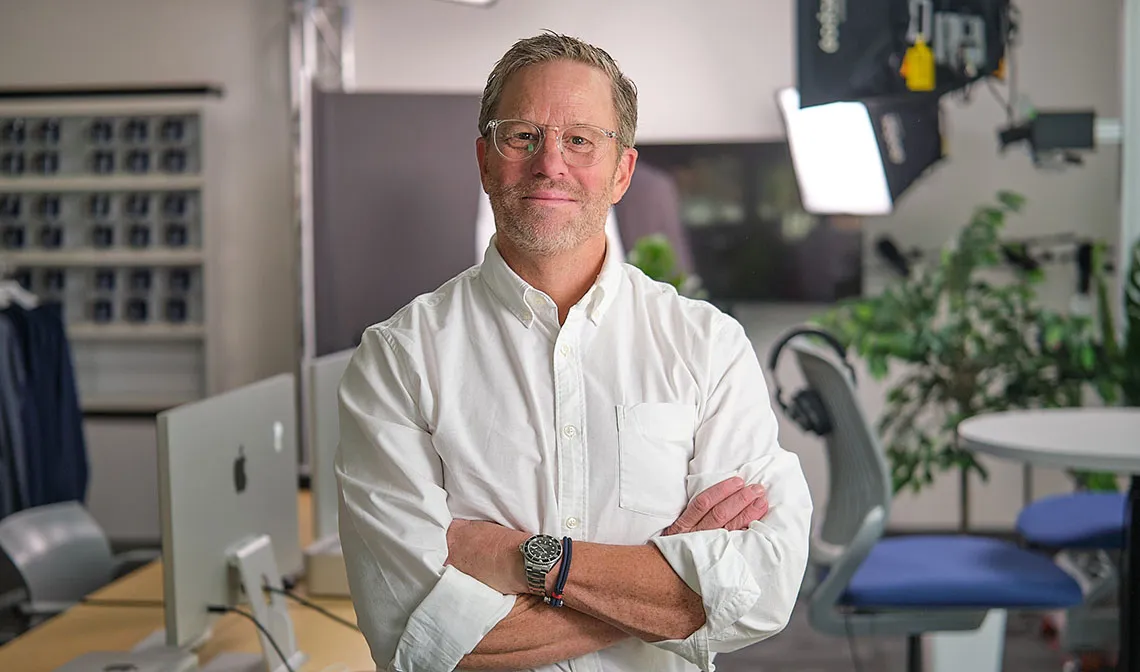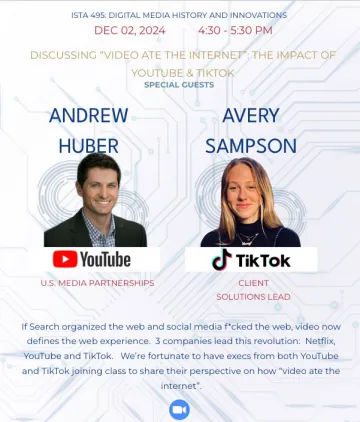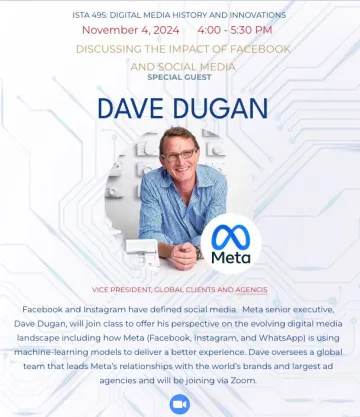Preparing InfoSci Students for Tomorrow’s Disruptive Tech Careers: Industry Insights from Digital Media Executive Jay Sampson

Jay Sampson, a College of Information Science lecturer with more than 25 years of leadership experience at high-tech companies like Microsoft and Adobe, offers not only insight but also instruction via the Digital Media History and Innovations course to help guide InfoSci students on their career development paths.
With more than 25 years of leadership at high-tech companies like Microsoft and Adobe, as well as pivotal roles in startups such as Magnite and Machinima, Jay Sampson knows firsthand what it takes to thrive in the dynamic world of digital media and technology. Now a lecturer at the University of Arizona College of Information Science, which attracts a diverse and international student body, Sampson shares his extensive corporate experience in the classroom. In his role, he also contributes to business development and project management for the U of A Terry J. Lundgren Center for Retailing, helping students bridge their studies with the complex realities of global markets. In his Digital Media History and Innovations course, Sampson offers students more than just academic knowledge—he provides a roadmap to navigating their future careers.
Sampson’s course, which covers the history, innovations and future directions of digital media, is infused with real-world relevance. Recognizing the diverse backgrounds and aspirations of his students, he leverages his industry expertise and connections with executives to bridge the gap between academic concepts and practical application. This preparation ensures students are equipped to enter the workforce not just as technologists but as adaptable, forward-thinking professionals.
“Today’s students are on the precipice of a transformational shift with generative AI, even bigger than the commercial internet boom of the 1990s,” Sampson says. This shift, he emphasizes, requires students to be proactive and prepared to evolve with the industry—a challenge that spans across cultural and geographic boundaries.
Advice for Aspiring InfoSci Professionals

Sampson’s core message to students is clear: embrace change, stay curious and don’t limit yourself to the bounds of your job description. “Jump on board and lean into the change,” he advises. “Find opportunities around AI and digital media, and don’t let the wave pass you by.” He likens today’s technological landscape to the dawn of the consumer internet, a time when staying ahead of trends defined careers.
Sampson underscores the importance of starting a career at a major company, if possible: “If you can, align yourself with a large, branded employer early on. These organizations offer unparalleled learning experiences and insights into how businesses operate at scale.” This foundation can set information science and other interdisciplinary tech students up for success, whether they choose to continue at such firms or pivot to more specialized roles later.
The Importance of Engagement and Flexibility
In an era increasingly defined by remote work, Sampson advocates for a balanced approach, particularly for those just starting their careers. “Fully remote positions can be limiting,” he points out. “Personal and professional growth often come from in-person interactions—hallway conversations, brainstorming sessions and the spontaneous exchange of ideas. These experiences shape not only your skills but your professional persona.”
He also emphasizes the value of seeking mentorship and advice from faculty while still in college. “Your professors are more than just teachers; they’re well-versed observers of industry trends,” Sampson says. “Take the time to talk with them about where they see the field heading and what opportunities are emerging. That insight can be invaluable as you chart your own path.”
Bringing Industry and Global Insight into the Classroom

Sampson’s commitment to blending academic learning with industry insights is exemplified by his initiative to bring guest speakers into his classes. Executives from leading tech companies like Amazon, Google and Meta share their career stories and perspectives, providing students with a rare opportunity to hear firsthand about the challenges and opportunities shaping the field. These interactions often lead to “light bulb moments” for students, connecting their coursework with real-world applications.
Sampson also draws on his own experience leading global teams at Microsoft and Adobe. Managing projects across Europe, Asia and the Americas has equipped him with a deep understanding of cross-cultural communication and collaboration—an advantage he shares with his students. “Our student population at the college is diverse, with many studying from abroad,” Sampson notes. His global experience across a breadth of tech leadership roles helps him bridge cultural norms and expectations—an advantage for American students aiming for international roles and for any student navigating tomorrow’s increasingly intercultural workforce. This global perspective complements the industry voices that contribute to his courses, enriching the learning environment further.
“I’m grateful for the industry leaders in the U.S. and abroad who contribute to my classes,” Sampson adds. “Their willingness to share their experiences enriches the learning environment and shows students the practical side of what they’re studying. It’s about preparing them to not only understand the field but to excel in it.”
Looking Ahead
As students prepare to enter the workforce, Sampson encourages them to remain adaptable and proactive. “Your entry-level job may be disrupted by new technology—expect it, and use it as an opportunity to learn and grow,” he advises. “Be curious, think beyond your tasks and immerse yourself in understanding how your work fits into the bigger picture. The first few years of your career are the time to double down on learning and effort; it’s an investment that pays off over the long term.”
Through his teaching, Sampson aims to empower College of Information Science students with more than knowledge—he instills in them a mindset ready to tackle the challenges and seize the opportunities of the future. His lessons, drawn from decades in the corporate world as well as the media and technology executives who share their experience and insights in class, ensure that students don’t just enter the workforce—they make an impact from day one.
Learn more about the research and faculty of the College of Information Science, or explore our dynamic undergraduate programs, minors and certificates.

